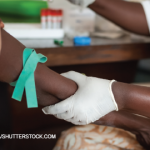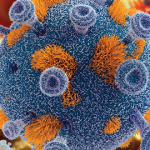Anti-Modified Protein Antibodies in Pre-RA
Rene Toes, PhD, is director of experimental rheumatology in the rheumatology department at Leiden University Medical Center, The Netherlands. A large part of his research focuses on chronic immune stimulation, the breach of tolerance and the evolution of human auto-reactive B cell responses, as well as the role of auto-antibodies and auto-reactive B cells in rheumatic diseases.
Dr. Toes, who has authored more than 350 publications on rheumatic diseases, said the extensive glycosylation of the ACPA-IgG variable domain is estimated to be present on more than 90% of ACPA molecules in RA and found in different RA populations, and that it precedes the development of RA. “They can be present years before disease onset, and [they] rise closer to disease onset. They might provide a predictive marker for disease development in ACPA-positive subjects at risk because progression to RA is unlikely in the absence of ACPA V-domain glycans.” Variable domain glycans (V domain) are located in proximity to the antigen binding pocket and interact with antigen-binding pockets.7-9
ACPAs differ from most other antibodies because they are extensively glycosylated in the V-domain. “This is a result of the introduction of N-linked glycosylation sites by somatic hyper mutation,” Dr. Toes said.10
Dr. Toes added that the glycans do not affect antigen-specificity or avidity for antigen-binding, but do provide a selective advantage to ACPA-expressing B cells. Because V domain glycans are introduced before disease onset, “their presence might provide a predictive marker for disease development in ACPA-positive subjects at risk.”11
Mike Fillon is a healthcare writer living in the Atlanta area.
References
- Nielen MM, van Schaardenburg D, Reesink HW et al. Specific autoantibodies precede the symptoms of rheumatoid arthritis: A study of serial measurements in blood donors. Arthritis Rheum. 2004 Feb;50(2):380–386.
- Pfeifle R, Rothe T, Ipseiz N. Regulation of autoantibody activity by the IL-23-TH17 axis determines the onset of autoimmune disease. Nat Immunol. 2017 Jan;18(1):104–113.
- Taneja V. Arthritis susceptibility and the gut microbiome. FEBS Lett. 2014 Nov 17;588(22):4244–4249.
- Ackerman ME, Das J, Pittala S, et al. Route of immunization defines multiple mechanisms of vaccine-mediated protection against SIV. Nat Med. 2018 Oct;24(10):1590–1598.
- Bradley T, Pollara J, Santra S, et al. Pentavalent HIV-1 vaccine protects against simian-human immunodeficiency virus challenge. Nat Commun. 2017 Jun;8(8):15711.
- Neidich SD, Fong Y, Li SS, et al. Antibody Fc effector functions and IgG3 associate with decreased HIV-1 risk. J Clin Invest. 2019 Nov 1;129(11):4838–4849.
- Kissel T, van Schie KA, Hafkenscheid L, et al. On the presence of HLA-SE alleles and ACPA-IgG variable domain glycosylation in the phase preceding the development of rheumatoid arthritis. Ann Rheum Dis. 2019 Dec;78(12):1616–1620.
- Kampstra A, Dekkers JS, Volkov M, et al. Different classes of anti-modified protein antibodies are induced on exposure to antigens expressing only one type of modification. Ann Rheum Dis. 2019 Jul;78(7):908–916.
- Vergroesen R, Slot L, Hafkenscheid L, et al. B-cell receptor sequencing of anti-citrullinated protein antibody (ACPA) IgG-expressing B cells indicates a selective advantage for the introduction of N-glycosylation sites during somatic hypermutation. Ann Rheum Dis. 2018 Jun;77(6):956–958.
- Scherer HU, Huizinga TW, Krönke G, et al. The B cell response to citrullinated antigens in the development of rheumatoid arthritis. Nat Rev Rheumatol. 2018 Mar;14(3):157–169.
- Hafkenscheid L, de Moel E, Smolik I, et al. N-linked glycans in the variable domain of IgG anti-citrullinated protein antibodies predict the development of rheumatoid arthritis. Arthritis Rheumatol. 2019 Oct;71(10):1626–1633.



